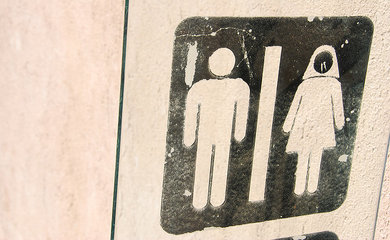The words ‘transgender character’ and ‘comedy’ in the same sentence are enough to make most trans people twitch. Comedies typically use transgender characters as the butts of jokes and ‘hilarious’ comments about their gender identity and role in the world, echoing the transphobia of the real world and contributing to the further dehumanisation of trans people&emdash;especially trans women. To add insult to injury, such roles are typically played by cis actors, underscoring social attitudes about gender identity by illustrating that film and TV producers can’t even be bothered to think of trans people as human beings with distinct identities; the trans community is evidently filled with people dressing up and pretending to be people they’re not.
That’s changing with two interesting pieces of media on opposite sides of the pond. In the United States, the film Boy Meets Girl opened to limited release and started streaming online in April. The romantic comedy revolves around a transgender character finding love in a somewhat unexpected place. Notably, Ricky (Michelle Hendley) is played by a transgender YouTube star, rather than yet another cis actress—or cis actor wearing dresses and flouncing across the screen.
Meanwhile, a television show of the same name has started filming in the UK. The BBC’s trans-focused comedy features Rebecca Root in the leading role, a landmark moment for television in general and UK television in particular. She’s among a small but growing group of trans actresses working in trans roles, changing the experience for trans and cis viewers alike. Both productions are challenging norms in film and television, confronting viewers with their own social attitudes in addition to demanding better representation in the industry.
The film has some troubling plot components; the apparent titular relationship should be better titled Girl Meets Girl, for example, as it involves a trans woman meeting a cis woman. It also takes pains to explore her transition status and emphasise that she’s ‘preoperative,’ as though this somehow invalidates her gender, like one is required to have a vagina punchcard in order to collect the gender prize. In addition to this rather transphobic titling and framing, it stumbles with clunky dialogue and the decision to telegraph subtext rather than making it more elegantly subtle. It suffers from a bit of ‘love is love’ on overload, hitting viewers over the head with its progressiveness rather than simply allowing the story to tell itself.
But it’s not made at the expense of Ricky, and the comedy doesn’t come from the fact that she’s transgender. Her gender is incorporated into the film as an aspect of her identity, and it’s relevant to the storytelling, but fundamentally this is a love story about people with different lived experiences and values coming together and reassessing their attitudes and beliefs. It follows classic US romantic comedy formats, and it’s very much designed to be fun, in addition to provocative, a welcome change from mockery of trans people or pained dramatic Issue Films. The film forces conversations, and reconsiderations for cis people thinking about how they view the trans community.
In the UK, the television series of the same name is much more progressive, despite being rooted in the sitcom style, which can be some of the most dangerous ground of all for trans people because such comedies tend to rely heavily on jokes and gags, many of which include the body and identity. The programme arose from a comedy contest, and focuses on a relationship between a cis man and an older trans woman; notably, the producers very specifically sought a trans actress for the role, unlike those involved in the US film, who stated in an interview with The Advocate that they didn’t want to cast a trans actress ‘just because she was trans’ and would have used a cis actress if she suited the role. Their decision to commit to a trans actress was a clear marker of intent from the beginning of the programme.
The BBC is known for high quality television in Britain and abroad, and many of its sitcoms are popular exports. British comedy is sharp, biting, punny, and layered with interesting complexity, precisely the sort of style that suits a programme like this one. A similar example in the US would likely be clunky and rough, relying too much on playing up Root’s transness and not enough on letting the story flow organically. For UK producers and creators, though, smart comedy comes naturally.
It’s hard to determine how Boy Meets Girl will go, as it’s still in filming and production and thus the public hasn’t had an opportunity to see episodes of the programme just yet. Likewise, US firms like Netflix haven’t had an opportunity to determine if they want to import or remake the show, depending on their tastes; one hopes that an import would be the first choice, given the hash US developers tend to make of beloved UK shows like The Office.
However, the programme appears promising thus far, thanks in no small part to its commitment to the trans community. The decision to insist upon a trans actress, even if it took searching or fighting with executives, is a welcome change from more traditional casting of trans characters, which seems to focus on ‘the best for the role’ (curiously, almost always a cis man in a dress) or ‘an anchor to draw in audiences and make a profit’ (also, usually, a cis man). What Boy Meets Girl sets out to prove is that you don’t have to compromise on identity to draw in audiences, and that audiences are ready for smart comedies that embrace the transgender community, rather than making a laughingstock of trans identities and lives.

